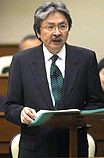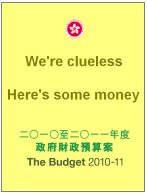Perhaps the most profound utterance made by Financial Secretary John Tsang in yesterday’s budget speech was on that well-known cornerstone of our economy, the concrete-box industry:
“We don’t know what a ‘healthy’ property market is exactly, but we want one. We don’t want property prices to go up, and we don’t want them to come down; we want everyone who has an interest in prices either rising or falling to get what they wish.”
Otherwise, to no-one’s great surprise, the Budget Speech was the mind-numbing, insipid same as ever.
- ‘One-off’ (for the fifth or whatever year in a row) handouts of waivers, rebates and subsidies in the form of modest party favours, so every little girl and boy gets something and goes home happy. Does anyone even remember how to pay property rates?
- Hand-wringing over the poor state of the fiscal reserves, which are down to a mere 20 months’ government expenditure. (Imagine keeping nearly two years’ salary stuffed under the mattress – and this is less than half of the total reserves.) Heaven forbid our leaders do something insane like giving this money to its owners, or spending it on something that doesn’t cost HK$3 billion a kilometre.

- Some weird face-giving blather about developing service industries in Shenzhen’s Qinhai district. (“The present consensus,” apparently, is that Shenzhen can pretend to develop a financial hub on its own, while Hong Kong will mumble about cooperation and partnership from time to time to shut them up and look good in case someone from Beijing passes through.)
The measures to cool the property market draw special attention, not because they are especially intelligent or likely to be very effective, but because the sight of this government even making a vague pretence at preventing housing from becoming less and less affordable is unprecedented. One of the proposals is to increase stamp duty on property transactions of over HK$20 million from 3.75% to 4.25%. When this idea was floated a week or two ago, the property cartel started bleating about how this would hurt the middle class (whose well-being, as we all know, is so dear to our tycoons’ hearts). However, they soon went silent, as if someone had had a word with them and told them to shut up. Rather than simply victimize vulnerable and hard-pressed members of the bourgeoisie trading up from, say, a HK$30 million to a HK$60 million apartment, the higher tax will also, probably, bite into the developers’ own profit margins – running at 40% or so in the case of a new project in, of all places, Western.
 By coincidence, it was also reported yesterday that Sun Hung Kai Properties will probably launch its luxury Larvotto complex in the next few weeks. This is the place in Ap Lei Chau with the ‘How well do you know ocean’ slogan that some curmudgeons resort to mocking. The first units to go on sale will start at HK$60 million, or HK$25,000 a square foot.
By coincidence, it was also reported yesterday that Sun Hung Kai Properties will probably launch its luxury Larvotto complex in the next few weeks. This is the place in Ap Lei Chau with the ‘How well do you know ocean’ slogan that some curmudgeons resort to mocking. The first units to go on sale will start at HK$60 million, or HK$25,000 a square foot.
It is unlikely that the extra few hundred grand in tax now payable on a HK$60 million place will make a difference. Larvotto is being touted as the new Bel-Air – the lavish place at Cyberport – on account of its sea views and spacious apartments. What the sales literature doesn’t mention, however, is that the area has a noise problem. (I am indebted to Mr Webb for calling my attention to this.)
The Environmental Protection Department opposed a residential development on this site because the ‘steel boat repairing activities’ across the road create too much noise (see 348th Town Planning Board meeting from April 2007, Agenda Item 6, p 24). The Town Planning Board (or at least those members who had not excused themselves because they had business links with Sun Hung Kai) took the developer’s side. The boat work was unauthorized – which of course always makes the resulting noise more bearable – and no enforcement action seemed possible, owing somehow to fishermen. Anyway, the developer had tried jolly hard to protect future residents from this nuisance, even building architectural vertical fins and installing non-openable windows. So the Board let it through, even though the noise levels in Towers 1 to 3 will exceed the HK Planning Standards and Guidelines limits. (I SAID THE NOISE LEVELS IN TOWERS 1 TO 3 WILL EXCEED THE HK PLANNING STANDARDS AND GUIDELINES LIMITS!!!)
As Mr Webb says, if and when the boatyards close, the waterfront will probably be redeveloped, so when Larvotto’s noise goes, the sea view goes too.
All yours for HK$25,000 a square foot.



If HKG wanted to do something popular, they could start by retiring the purple plastic $10 note, which everyone hates.
You never had it so good!
Some of that money should be spent on developing a debit function on taxi metres whereby every time a taxi driver pushes his horn, $1.50 is knocked off the fare. That way either we could all ride for next to nothing, or Hong Kong would be significantly quieter.
Good idea Historian. Perhaps Toyota could also install cut-off switches so the horn is disabled after 1 second of continuous use and disabled for a minute or five. However, they seem to have enough to worry about right now.
It could be worse. At least the Government didn’t take the advice of Michael Tien, heir to a textile industry business, who suggests in the SCMP today that the Government should give subsidies to, er, re-establish the textile industry in Hong Kong.
Mind you, they’ll probably do that next year.
The name Larvotto…I keep mis-reading it as “Lazaretto”.
I’ve the same problem with the Mazda Premacy, somehow I always read Pregnancy.
And for the budget, what could you expect anyway? Changes? Visions?
I bet the really poor folks at the bottom of the ladder in sub-divided ‘apartments’ here have hardly ever benefited from these budget give-aways. I’m quite sure their landlords who have had their electricity bills,rates, annual business registration tax largely paid for by the government over the past couple of years or so have not passed on the savings to their tenants.